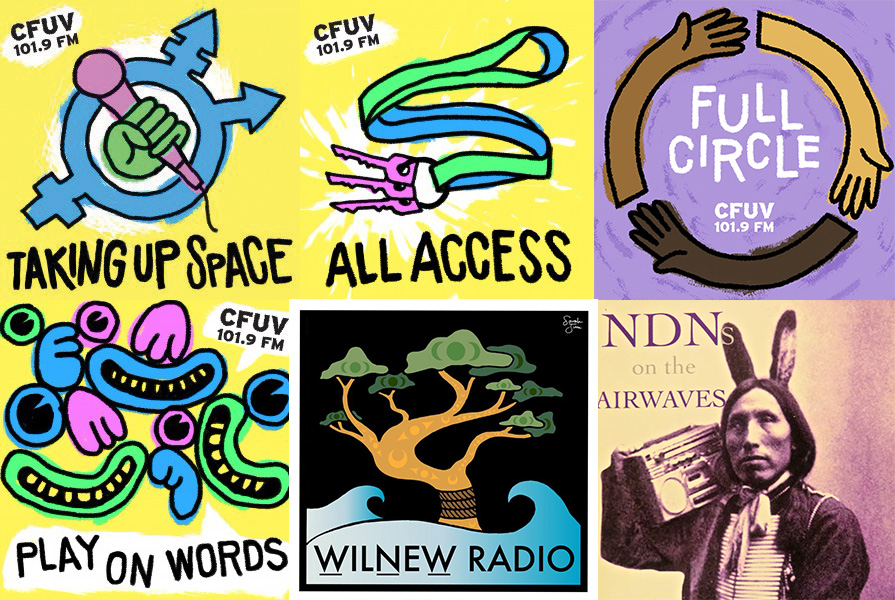New season asks big questions about gender non-binary life, decolonizing the Western arts scene, and more

UVic’s radio station, CFUV, spent the semester digging — trudging through information, audio tapes, interviews, and sources to bring their third season of podcasts to life.
As this season draws to a close, Mary Decker, CFUV’s spoken word coordinator and this season’s producer, said that some of her favourite episodes are not even released yet. One of her favorites includes September’s season finale of Taking up Space, CFUV’s intersectional feminism podcast, which shines a spotlight on gender non-binary people.
“Coco [Nielsen], our operations director, took the lead on that one and did all of the interviews, and it’s such an inspiring exploration of what it means to be gender non-binary,” she says in a phone interview.
“It just so beautifully captures how challenging and heart-aching it can be while also illuminating how magic it can be, and how special it can be to be trans and non-binary, and I think it’s a real tear-jerker.”
Illuminating often unseen people and aspects of society is exactly what CFUV’s podcast crew had in mind over the season. Five series this summer dug deep into feminism, institutional racism, sexuality, university life, and more.
For example, one episode of CFUVs music scene podcast, All Access, looked at how Indigenous content in Victoria was centred from an arts and music perspective, according to the show’s producer and CFUV communications coordinator Nicola Watts.
“We did a really interesting episode on ways in which local arts communities and councils are trying to promote Indigenous content and centre that, but also how the whole arts structure we currently follow is very Westernized,” Watts says.
The way that we look at and exist with art is very white-centered, says Watts. She asks listeners to critique their own methods and question what is Victoria’s music scene, while learning how to make a really well-meaning engagement with Indigenous art “rather than just a tokenization kind of thing.”
Podcasts have grown exponentially popular within the past few years, with formats and quality varying. Usually when people are working on podcasts, station manager Glen Swarnadhipathi says, it’s two people in a room talking. But he says Decker had this heavily-produced idea with many hidden elements in the podcasts that are only clear if you pay attention.
“All those little details come down to Mary wanting to step outside of the just two people talking aspect of most independent-produced podcasts,” Swarnadhipathi says, adding he thinks it stacks up neatly against commercialized podcasts.
There is a storytelling aspect to the episodes, which Decker says she wanted to style similar to other well-known podcasts such as the Radiolab or This American Life. Each episode is approximately an hour long, and for the often first-time producers, it came with a lot of work.
“There was definitely a huge learning curve for it,” Decker says. “Radio is a non-intuitive art form.
“Making radio documentaries is really really hard … I think that we underestimated how long each episode was actually going to take, so we stretched ourselves pretty thin trying to get them all done.”
A total of 40 episodes were crafted over the summer, and conceiving the ideas was just the easy part.
“You have to investigate the story,” says Decker. “You have to do all of that reporting. You have to communicate and schedule all your interviews. You have to do the interviews — which can take hours and then you might need a follow-up interview afterwards. And then you have to go through all of that tape and choose all the parts you want to use, and then you have to create your story, and slot in all that tape into your story and then not even mention the writing that goes into it, and then of course the editing.”
She ends with a laugh. “So it’s a huge endeavour.”
Bringing the “narrative arc” to a podcast helps those learning about often complex topics to do so in a more easily digestible way, Decker adds.
“I just think that storytelling in audio form as a medium is such an incredible way to engage people, and learning about concepts like intersectional feminism and institutional racism, — like these big huge topics when you can learn about these things in a story — it can be really transformative,” Decker says. “And I think it’s really important.”






